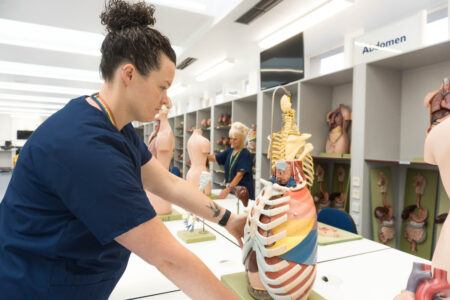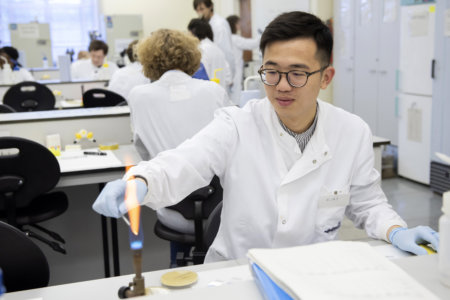
For those looking to do something that leaves an impact, a career in health undoubtedly stands out as a top choice. An age-old vocation central to human survival and wellbeing, health-related fields provide the opportunity to make a real difference in people’s lives.
From school nurses and counsellors who guide and protect our young, to first responders and surgeons who stand between life and death every day, health workers across the globe ensure the full functionality of health systems. Yet, the World Health Organisation (WHO) estimates a shortfall of 11 million health workers by 2030. According to WHO, this is in part due to the chronic under-investment in the education and training of health workers in some countries.
Thankfully, numerous institutions have continually done the opposite, promoting and investing in the education of future health workers. Here are three long-standing universities located across Europe transforming health students into highly employable, high-impact graduates.

The University of Chester is located in the historic city of Chester, founded by the Romans around AD 79. Source: University of Chester
University of Chester
Situated in the historic city of Chester, in North West England, the University of Chester’s Faculty of Health, Medicine and Society is a distinguished hub for aspiring health professionals. Founded in 1839, the university combines academic tradition with forward-thinking innovation, offering students a unique learning environment enriched by the city’s Roman heritage and architectural charm.
The Faculty of Health, Medicine and Society is a leading destination for those pursuing careers in healthcare, medicine, and social well-being. With a strong emphasis on employability, the university provides comprehensive support through its Careers and Employability team, helping students transition confidently into professional roles. Chester continues to perform strongly in the UK’s Graduate Outcomes Survey (GOS), ranking among the top five institutions in the North West for graduates in high-skilled employment and consistently exceeding national averages.
Courses within the faculty are designed to meet the evolving needs of the NHS, local authorities, and global health sectors. At Chester Medical School, students can pursue undergraduate and postgraduate degrees in biomedical sciences and medical practice, including the four-year graduate-entry MBChB (Bachelor of Medicine, Bachelor of Surgery), open to applicants with a prior degree in any discipline, and the MSc Biomedical Science.
The School of Nursing and Midwifery prepares students for careers across all major nursing specialisms, such as Adult Nursing and Learning Disability Nursing. Postgraduate options – which include the MSc Pre-Registration Adult Nursing or Mental Health Nursing — alllead to professional registration with the Nursing and Midwifery Council (NMC).
Meanwhile, the School of Allied and Public Health focuses on public health, community care, and allied health professions, supporting the development of a resilient and responsive healthcare workforce.
Completing the faculty’s offering is the School of Society, which explores the social dimensions of health and well-being, with courses that address the broader societal challenges impacting healthcare delivery. The university offers a BSc (Hons) Psychology degree accredited by the British Psychological Society (BPS), providing a strong foundation for careers in mental health, research, and behavioural science.

Sapienza University welcomes thousands of international students every year who come to Rome to study or pursue research on international mobility programmes, or to enrol in their degree programmes. Source: Sapienza University of Rome
Sapienza University of Rome
Another university set in a historic landscape, Sapienza Università di Roma was founded all the way back in 1303 as the papal Studium Urbis by Pope Boniface VIII. As the first pontifical university, it eventually became a royal university, then a state university in 1935. Studies of health and medicine have been a core part of the studium ever since it was established.
Today, the university’s Faculty of Pharmacy and Medicine continues to offer a variety of health programmes. Specifically, it has eight departments: Chemistry and Technology of Drugs, General and Specialist Surgery, Physiology and Pharmacology, Molecular Medicine, Public Health and Infectious Diseases, Biochemical Sciences, Medico-Surgical Sciences and Biotechnologies, and Anatomical, Histological, Forensic and Locomotor System Sciences.
In its internationalisation efforts, the faculty offers several programmes which are fully taught in English. Students and teaching staff have many opportunities for international mobility. The university also has a dedicated help desk for international students, offering in-depth and customised information to global students who wish to study, conduct research or participate in internships at Sapienza.
Overall, Sapienza University has clinched strong rankings and was deemed first among Italian generalist universities according to the 2026 edition of the QS World University Rankings.

University of Helsinki’s Medical Faculty publications represent approximately a third of the university’s publications as a whole. Source: University of Helsinki
University of Helsinki
Finland is renowned globally for its holistic approach to education, and as the nation’s oldest university, the University of Helsinki has long been known for its contributions to society, education and welfare. Originally founded in 1640, it’s now home to an international scientific community of 40,000 students and researchers and typically ranks in the top 1%.
Among its departments is the Faculty of Medicine, which has been the most popular faculty at the university in terms of the number of applicants. The faculty educates all sorts of aspiring health care specialists, including physicians, dentists, psychologists, and speech and language therapists, as well as master’s degree holders in translational medicine.
The faculty is driven by a mission to conduct high-quality research and provide research-based undergraduate and postgraduate education in medicine and dentistry. This is rooted in their belief that long-term, high-quality, and high-impact research form the foundation for training future healthcare professionals. To that end, the Faculty of Medicine is known for its high quality translational research and has trained numerous Finnish experts for diverse positions both in Finland and abroad.
The faculty is also a part of the Academic Medical Centre Helsinki (AMCH), touted as one of the best medical campuses in Europe. Core to the AMCH is the cooperation between the Faculty of Medicine, the Helsinki Institute of Life Science, and the Hospital District of Helsinki and Uusimaa to provide the very best for its patients.









